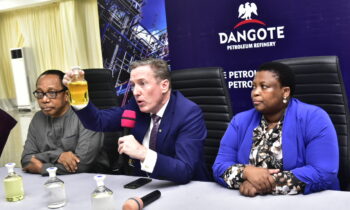
…Barkindo says Iran’s return would not distabilise market
Olusola Bello
Nigeria may experience some increase in her earnings from crude oil export as the price of crude for the first time in over two years hit $71 per barrels on Tuesday.
This followed the decisions of OPEC+ oil producers who agreed on Tuesday to stick to the existing pace of gradually easing supply curbs through July, as they sought to balance expectations of a recovery in demand against a possible increase in Iranian supply.
The only problem the country has now is that it would spend a substantial amount of the money on fuel importation thereby decreasing the benefits to be derived from such price movement. Huge sum of money is spent as subsidy on imported petrol which price is equally affected by increases in the prices of crude oil at the international market
The country currently produces less than two million barrels of crude oil per day due to restrictions by OPEC+
The Organization of the Petroleum Exporting Countries and allies – known collectively as OPEC+ – decided in April to return 2.1 million barrels per day (bpd) of supply to the market during May through July as it anticipated demand would rise despite high numbers of coronavirus cases in India.
Since that decision, oil prices have extended their rally and have now gained more than 30% this year, although the prospect of more crude from Iran, as talks on reviving its nuclear deal make progress, has limited the upside.
Benchmark Brent crude hit $71 a barrel, its highest since March, on Tuesday.
Speaking after an OPEC+ conference – being held online most months after the pandemic prevented the usual face-to-face meetings in Vienna – Saudi Energy Minister Prince Abdulaziz bin Salman said he saw a good recovery in demand in the United States and China.
“The vaccine rollout has gathered pace with around 1.8 billion vaccines administered around the world … This can only lead to further rebalancing of the global oil market,” he told an online news conference.
OPEC Secretary General Mohammad Barkindo said he did not expect higher Iranian oil supply to cause problems if and when Tehran reaches a nuclear deal with Western powers in return for an easing of oil sanctions.
“We anticipate that the expected return of Iranian production and exports to the global market will occur in an orderly and transparent fashion,” he said in a statement.
Iran could boost production and exports by between 1.0 and 1.5 million bpd if sanctions are fully removed.
OPEC+ still forecasts a 6 million bpd jump in oil demand in 2021 – equivalent to 6% of global consumption – as the world recovers from the COVID-19 pandemic.
OPEC+ cut output by a record 9.7 million bpd last year as demand collapsed when the COVID-19 pandemic first struck. As of July, the curbs still in place will stand at 5.8 million bpd.
On Tuesday, OPEC+ did not discuss output levels beyond August, three sources said. OPEC+ would next meet on July 1.
The Meeting however noted the ongoing strengthening of market fundamentals, with oil demand showing clear signs of improvement and OECD stocks falling as the economic recovery continued in most parts of the world as vaccination programmes accelerated.
It also welcomed the positive performance of Participating Countries in the Declaration of Cooperation (DoC).
Overall conformity to the production adjustments was 114% in April (including Mexico), reinforcing the trend of high conformity by Participating Countries.
In view of current oil market fundamentals and the consensus on its outlook, the Meeting: Reaffirmed the existing commitment of the participating countries in the DoC to a stable market in the mutual interest of producing nations; the efficient, economic and secure supply to consumers; and a fair return on invested capital.
Reconfirmed the existing commitment of the 10th OPEC and non-OPEC Ministerial Meeting in April 2020, amended in June, September, and December 2020, as well as in January and April 2021 to gradually return 2 million barrels a day (mb/d) of the adjustments to the market, with the pace being determined according to market conditions.
It reiterated the critical importance of adhering to full conformity, and taking advantage of the extension of the compensation period until the end of September 2021, as requested by some underperforming countries.




